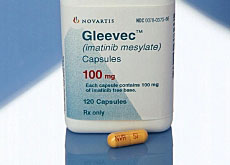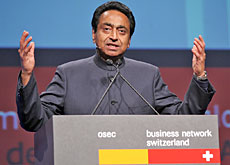India seeks end to Gleevec patent case

The Indian health minister has urged Swiss pharmaceutical giant Novartis to end its legal bid to win patent protection in the country for anti-cancer drug Gleevec, also known as Glivec.
Anbumani Ramadoss added the Indian government could overrule existing patents with a system of licences that allows firms to produce vital drugs if deemed to be in the public interest.
Novartis is testing India’s new patent protection regime that was established two years ago.
This differs from international standards by only protecting completely new compounds that were discovered after 1995.
The leukemia drug Gleevec fell foul of this clause because its active ingredient, the beta crystal, is deemed to be a modification of an existing compound.
Ramadoss said he feared a court decision in Novartis’ favour could have the knock-on effect of choking the supply of affordable anti-AIDS drugs in India.
The Madras High Court, which began examining the case in late January, last week reserved judgement on Novartis’ challenge.
Generic threat?
Novartis argues that 99 per cent of patients in India already receive Gleevec free of charge and that it only wants to protect its intellectual commercial rights.
“Our action in India will in no way impede access to medicines. We just want to ensure that there is effective protection in place to ensure innovative treatments for patients in India in the future,” spokeswoman Carrie Scott told swissinfo.
But various pressure groups, including the Swiss-based Médicins sans Frontières and the Berne Declaration, say stringent patent protection would kill India’s tradition of producing cheaper generic drugs.
They argue that millions of poorer patients in India could be denied access to these cheaper copycat drugs if patent protection is strengthened in the country – a charge that Novartis denies.
“We are the second largest manufacturers of generics in the world so we recognize the value that they bring to the market,” Scott said.
Scott added that current generic versions of Gleevec that were introduced to the Indian market before 2005 could continue to be sold even if the drug gets patent protection.
Former Swiss cabinet minister Ruth Dreifuss added her voice to the growing chorus of criticism against the pharma giant earlier this year, saying: “I fear that the effects of such a step by Novartis would be terrible for patients in poor countries.”
swissinfo, Matthew Allen with agencies
Gleevec was first registered in the United States in 2001. Last year it was Novartis’ second most successful drug in terms of sales, generating $2.5 billion (SFr3.13 billion).
Novartis announced a net profit of $7.20 billion (SFr9 billion) for 2006 – up 17 per cent on 2005. Full-year sales were $37.02 billion, up 15 per cent on the previous year, while operating income was up 18 per cent.
India introduced its drug patent law on January 1, 2005 to comply with World Trade Organization rules.
The Indian authorities have denied Novartis patent protection for the beta crystal, the active ingredient of Gleevec, ruling that it was an adaptation of an existing compound. The crystal has been granted protection in 36 other countries.
Novartis says 99% of Gleevec users in India get the drug free. Médicins sans Frontières says other generic companies in India supply their versions at discounted rates.

In compliance with the JTI standards
More: SWI swissinfo.ch certified by the Journalism Trust Initiative












You can find an overview of ongoing debates with our journalists here . Please join us!
If you want to start a conversation about a topic raised in this article or want to report factual errors, email us at english@swissinfo.ch.